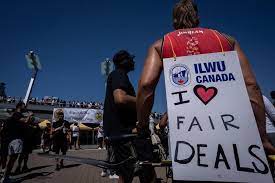Best CCTV Security Camera in Brampton
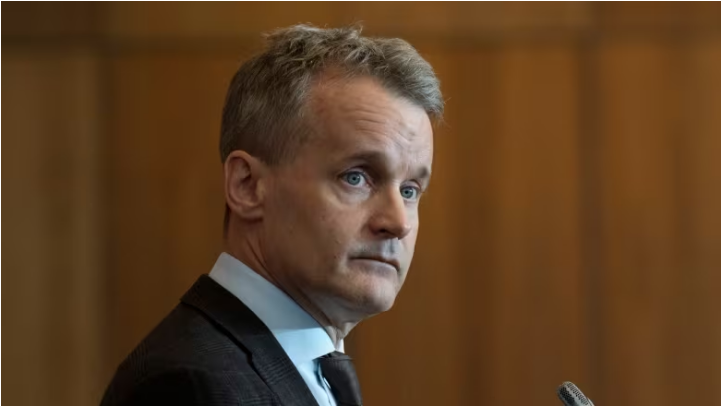
Labour Minister Seamus O’Regan, seen here in October 2022, said Saturday that binding arbitration or an imposed agreement could be coming to end job action that shut down B.C.’s ports earlier in July. (Adrian Wyld/The Canadian Press)
Best CCTV Camera in Brampton
Federal Labour Minister Seamus O’Regan says he may be looking at binding arbitration to end a job dispute at B.C.’s ports after union workers rejected a mediated deal.
In a Saturday statement, O’Regan said that he had directed the Canada Industrial Relations Board (CIRB) to find out if the rejection meant a negotiated agreement was impossible.
“If the Board determines that to be the case, I have directed them to either impose a new collective agreement on the parties or impose final binding arbitration to resolve outstanding terms of the collective agreement,” the statement reads.
Labour Minister O’Regan adds that the federal government was “prepared for all options” in the job action, leaving open the possibility of back-to-work legislation.
International Longshore and Warehouse Union Canada (ILWU) workers had rejected the agreement on Friday, extending job action that prevented billions in goods from moving for almost two weeks earlier this month.
In a letter posted on the union’s website, union president Rob Ashton says workers are now calling on their employers to “come to the table” and negotiate directly, instead of doing so through the B.C. Maritime Employers Association (BCMEA).
In a statement, the BCMEA says it is disappointed the four-year tentative agreement was rejected, calling it a “good deal that recognized the skills and efforts of B.C.’s waterfront workforce while providing certainty and stability for the future of Canada’s West Coast ports.”
Cheap CCTV Camera in Brampton
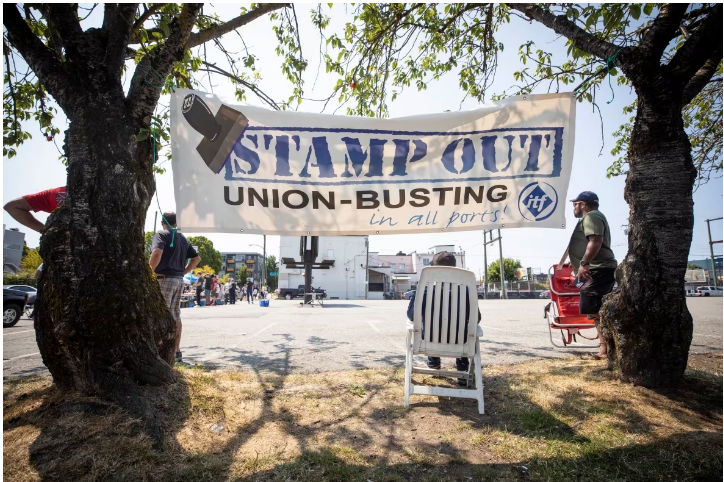
The 13-day strike had shut down ports across B.C. was initially ended by a tentative deal, but the union attempted to restart the strike shortly after. That was deemed illegal by the Canada Industrial Relations Board. (Ben Nelms/CBC)
Home CCTV Camera in Brampton
The four-year agreement between the union and maritime employers went to a vote of about 7,400 workers on Thursday and Friday, after union leaders presented the deal to local chapters on Tuesday. ILWU workers staff more than 30 port terminals and other sites across the province, including Canada’s largest port in Vancouver.
The deal worked out with federal mediators had put a temporary halt to a 13-day strike that had commenced July 1, but its fate see-sawed wildly as the union leadership then rejected it and tried to go back to picket lines.
When that was deemed illegal by the CIRB, the union submitted a new 72-hour strike notice, only to withdraw it hours later.
On July 20, the union announced it was recommending the deal and would put it to a full membership vote.
Mark Thompson, a professor emeritus at UBC’s Sauder School of Business, says he is perplexed over union membership rejecting the latest deal.
“I’m surprised, but I can understand why it didn’t pass,” said Thompson. “The package simply didn’t meet the union’s priorities.”
Thompson says because the union was so adamant about the issues of job security and outside contracting, those issues may have been unaddressed on the contract before them.
“That’s the signal, that something which is important to them is going left unaddressed.”
On Friday evening, the BCMEA revealed details of the deal.
It says the four-year package rejected by the ILWU included a compounded wage increase of 19.2 per cent and a signing bonus of $1.48 per hour worked to be paid to each employee.
“Regrettably, ILWU’s rejection once again leaves businesses, Canadians and all those who depend on a stable, well-functioning supply chain hanging in the balance,” reads a statement from the employer.
Thompson says the federal government under Justin Trudeau has been supportive of collective bargaining in the past, and has been unwilling to impose a settlement by legislation.
The deal’s current failure will, however, give impetus to calls for back-to-work legislation that came earlier from industry groups and politicians, including Alberta Premier Danielle Smith.
On Saturday, the Canadian Federation of Independent Business characterized the rejection of the deal as “irresponsible” and said they were extremely disappointed.
“If the union issues another 72-hour strike notice, government will have to immediately introduce back-to-work legislation,” read a statement from the business group.
Federal NDP leader Jagmeet Singh — whose party has a supply-and-confidence deal with the Liberals in Parliament — said the better course of action is to get both sides of the dispute back to the negotiating table.
“Port workers in British Columbia are fighting for fairness; they want to know that they’ll have stability and a good wage so that they can continue supporting their families for years to come,” Singh said in a statement.
“We cannot lose sight of what is at stake for B.C. port workers, but also for all workers. Going to work to earn a living that feeds your family and puts a roof over your head is not too much to ask when CEOs are enjoying record profits.”
The earlier job action was serious enough that Prime Minister Justin Trudeau convened the government’s incident response group to discuss the matter, an occurrence typically reserved for moments of national crisis.
Best CCTV Camera in Brampton
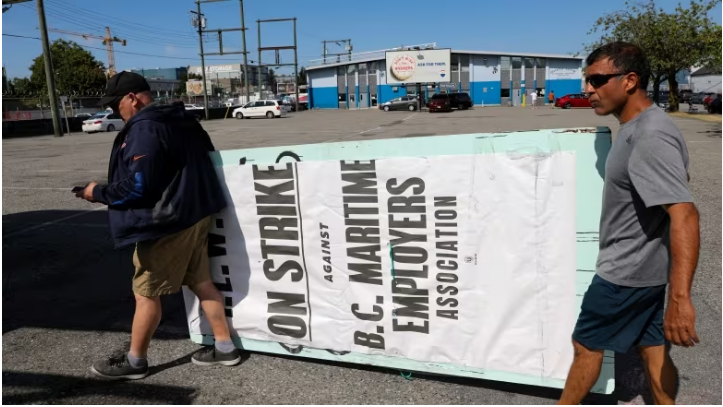
Port workers with the International Longshore and Warehouse Union Canada remove a strike sign from a picket line outside the despatch hall in Vancouver on July 13. (Chris Helgren/REUTERS)
Cheap CCTV Camera in Brampton
A 13-day strike stopped billions of dollars’ worth of goods from moving through province’s ports
More large-scale disputes like the industrial action at British Columbia’s ports may be on the horizon, a labour movement researcher is warning, as longshore workers gathered to consider a possible agreement with employers.
The local chapters of the International Longshore and Warehouse Union held meetings Tuesday to discuss the deal, which the B.C. Maritime Employers Association says is the same agreement union leaders had previously rejected without a full-membership vote.
McGill University associate professor of sociology Barry Eidlin said it is likely union leaders are under pressure to sell the deal to members due to the possibility of back-to-work legislation — even if federal officials have said publicly that resolution-by-negotiation is the preferred outcome.
But Eidlin said members are aware their leadership previously rejected the deal, which “doesn’t send a strong signal” about the quality of the deal and gives the impression it is instead getting “rammed through.”
Eidlin also said the full membership may not be receptive to the deal, given that issues such as automation and jurisdiction of maintenance work may be “existential” for the long-term viability of these workers’ jobs.
“This isn’t just about dollars and cents or a pension increase,” Eidlin said. “Not that those things aren’t important, but these are really some fundamental issues about the future of what work on the dock is going to look like.
“Even if you have the threat of back-to-work legislation looming over the whole process, I think the issues at stake are of such import that members are going to think really hard about what the language in this contract is — and whether or not they can live with it.”
He said similar issues facing workers in other industries, along with the mounting challenges of cost of living and workplace flexibility, may be changing the labour movement’s calculations on whether to use strike action as a negotiating tactic — something that has essentially flatlined since the 1990s.
“I think the current moment that we’re living in suggests that we could have reached some sort of breaking point, where enough workers are saying, ‘We’ve had enough, we need to do something.”‘
ILWU members filed into meetings at Vancouver’s Croatian Cultural Centre Tuesday morning to hear from leaders of the Local 500 chapter, representing longshore and other port workers in the city.
Several workers attending the meeting declined to comment to media.
The labour dispute triggered a 13-day strike that started on Canada Day, stopping billions of dollars’ worth of goods from moving in and out of some of the country’s busiest ports.
Strike action was suspended when the contract was reached with the help of a mediator two weeks ago, but it was then reinstated when the union leadership turned down the plan early last week.
A labour board then ruled the second strike action by the port workers was illegal, prompting the union to issue 72-hour strike notice, which it then reversed hours later.
Home CCTV Camera in Brampton
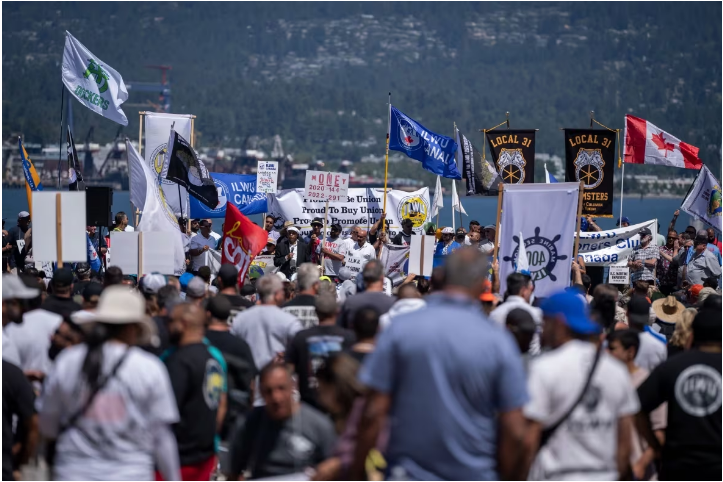
The International Longshore and Warehouse Union Canada and the B.C. Maritime Employers Association agreed to a tentative four-year deal on Thursday morning, ending a 13-day shutdown of more than 30 ports in B.C., including Canada’s largest, the Port of Vancouver. (Ethan Cairns/The Canadian Press)
Best CCTV Camera in Brampton
Dalhousie University Schulich School of Law assistant professor Liam McHugh-Russell called the tumultuous developments “uncommon but not unheard of” in labour negotiation.
McHugh-Russell said while there had been calls from provincial and business leaders for back-to-work legislation, the federal government has been hesitant to go down that path since landmark Supreme Court rulings in 2007 and 2015.
Those rulings are reflected in the government’s handling of the port dispute up to this point, he said.
The 2007 decision makes collective bargaining a constitutional right, and the 2015 ruling added the right to strike.
“We are seeing to some degree a playing-out of a shift and a change in the constitutional context in which strikes are played out,” McHugh-Russell said.
“[The Supreme Court decisions] have really put the brakes on the ability and willingness of government to bring in legislative solutions to these problems.”
Union members are expected to vote on the offer later this week, but there’s no word yet on when the results could be made public.
Cheap CCTV Camera in Brampton
Home CCTV Camera in Brampton
Just when it looked like it was ending, job action at ports in British Columbia resumed — sort of.
Last Thursday, a tentative deal was reached to end the two weeks of strikes that shut down 30 ports in the province, including Canada’s largest, the Port of Vancouver.
But Tuesday saw the deal rejected by the union and picket lines go back up.
Then Wednesday, a federal board declared the renewed strikes illegal, leading to their hasty dismantling.
It was announced later Wednesday that job action will resume Saturday. Then, hours later, that seemed to be called off.
The strike’s latest turns have led to a number of questions from CBC readers. Here are some answers.
International Longshore and Warehouse Union (ILWU) members, about 7,400 strong, did not ratify a tentative deal reached with their bosses at the B.C. Maritime Employers Association (BCMEA) over the weekend.
The rejection of the deal, reached with federal mediation, sent workers back to the picket lines Tuesday.
Federal Labour Minister Seamus O’Regan said that same day the strike could not continue.
On Wednesday morning, the Canada Industrial Relations Board (CIRB) ruled the new strike was illegal because the union didn’t provide 72 hours’ notice.
A decision tweeted by Labour Minister O’Regan stated the union argued the renewed action was a continuation of the previous strike. The labour tribunal disagreed and ordered dock employees back to work.
Best CCTV Camera in Brampton
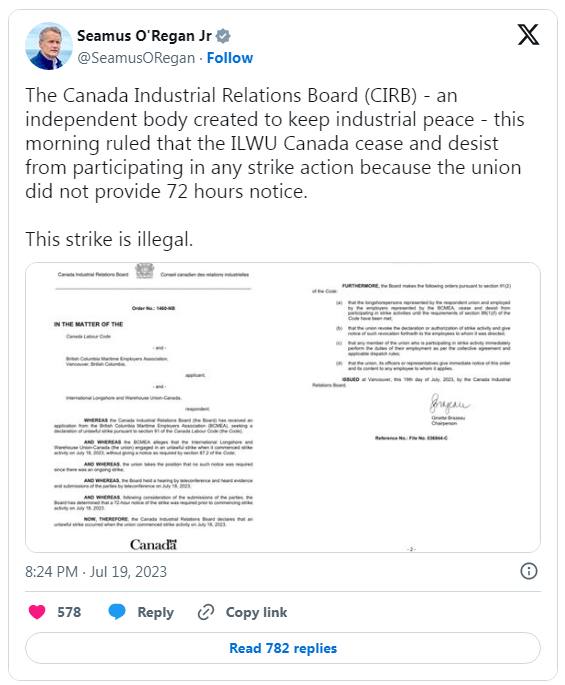
Cheap CCTV Camera in Brampton
The BCMEA said the union served it with a 72-hour strike notice to resume the strike starting Saturday morning.
That led Prime Minister Justin Trudeau to convene a crisis cabinet committee, according to a government source with knowledge of the matter.
But then the union posted a memo to its Facebook page saying the Saturday strike resumption had been called off.
With the 72-hour notice removed, the union can’t resume strike action on Saturday unless it files another notice, according to the Canada Labour Code as described in a Canada Industrial Relations Board decision issued against the union this morning.
The BCMEA, in a Wednesday statement, said the deal would include a compounded 19.2 per cent wage increase over four years for ILWU workers, raising their median income from $136,000 to $162,000, plus benefits and pension.
CBC News has asked the ILWU to confirm these details.
The union statement stated the deal was voted down by the “ILWU Canada Longshore Caucus.” It made no mention of a membership vote.
CBC has asked ILWU for more information on its processes.
The workers were ordered to return to their duties immediately. A CBC camera crew witnessed some crane movement at the Port of Vancouver Wednesday afternoon.
A number of politicians, including the premiers of Alberta and Saskatachewan and Conservative Party leader Pierre Poilievre, have called for Parliament to reconvene and legislate an end to the strike.
Labour Minister O’Regan has not directly said that’s what is coming, but said the tentative deal was “fair and balanced.” He’s said businesses affected by the port strike cannot face further disruptions and all options are on the table.
Mark Thompson, a professor emeritus of industrial relations at UBC, said the feds’ patience is wearing thin.
“The minister has drawn the line in the sand: if you can’t do it yourselves, I’ll recommend Parliament do something,” he told The Early Edition host Stephen Quinn.
“We don’t know what legislation is going to be. There’s no standard format,” Thompson said, but added such an approach can be a double-edged sword.
“If the parties know that Parliament is likely to act, they simply don’t bargain hard enough, make the difficult decisions on reaching a settlement.”
While the Conservatives have urged a legislated end to the strike, the federal NDP, which has a confidence-and-supply agreement to prop up the minority Liberal government until 2025, says Parliament should not get involved beyond encouraging negotiations.
“Don’t trigger any back-to-work legislation because that will undermine the workers,” NDP Leader Jagmeet Singh said Wednesday.
Thompson says the union is the one calling the strike, which gives them some responsibility for the situation.
But he said the BCMEA’s initial offer was “ludicrously low” — yet, despite this, the business community has been united behind the employer.
“They might’ve suggested … the BCMEA to address the union’s concerns more seriously, and we could have avoided some of this,” Thompson said. “But that isn’t how it works.”
Thousands of port workers across British Columbia are resuming strike activity after failing to ratify a tentative deal that was reached through federal mediation.
More than 7,400 workers from the International Longshore and Warehouse Union (ILWU) had walked off the job from July 1 until July 13 over issues like port automation, outside contracting and the increasing cost of living.
A tentative agreement had been reached between the ILWU and their employer, the B.C. Maritime Employers Association (BCMEA), on July 13 after Labour Minister Seamus O’Regan asked for terms to end the strike, drawn up by a federal mediator.
However, the BCMEA said in a statement Tuesday that strike activity will resume due to ILWU’s internal caucus rejecting the tentative agreement and not ratifying it.
On Tuesday night, Labour Minister O’Regan and Transport Minister Omar Alghabra said workers and employers across the country “cannot face further disruption on the scale we saw last week.”
“We are looking at all options. We will have more to say on this tomorrow,” they said in a statement.
They say the mediated agreement represented a fair and balanced deal for both sides.
“We have been patient. We have respected the collective bargaining process. But we need our ports operating.”
In their Tuesday statement, the BCMEA said: “Both the BCMEA and ILWU recommended ratification of the tentative settlement to their respective memberships.
“The BCMEA ratified the agreement on July 13.”
The BCMEA said the mediated four-year collective agreement included “considerable” wage and benefit hikes, as well as provisions addressing the union’s concerns around outside contracting and worker retention.
ILWU Canada said the recommended terms were not sufficient to protect port workers’ jobs “now or into the future.”
“The term of the collective agreement that was given with today’s uncertain times, is far too long,” reads a statement from union president Rob Ashton.
“We must be able to re-address the uncertainty in the world’s financial markets for our members.”
Around 5 p.m. Tuesday, picketing workers had returned to the BCMEA dispatch office near the Port of Vancouver. Chants of “An injury to one, an injury to all” and “one day longer, one day stronger” were heard from ILWU members.
The president of the Greater Vancouver Board of Trade, Bridgitte Anderson, said in a statement that she was “dismayed and disappointed” that the strike had resumed.
“We are greatly concerned about the impacts the continuation of the strike will have on Canada’s international reputation as a reliable trade partner,” she said.
“In less than two weeks, business across Canada were facing shortages, temporary layoffs, and, in some cases, total shutdowns.”
The strike had stopped all goods flowing through the B.C. coast, which included Canada’s busiest port in Vancouver.
Industry groups had estimated the strike cost billions of dollars in trade disruptions, and led to temporary layoffs at industry facilities in Prince George and Saskatchewan.
Multiple industry groups, as well as Alberta Premier Danielle Smith, had called for Parliament to reconvene and pass back-to-work legislation to end the strike over the initial 13-day period.
On Tuesday, Smith reiterated her calls for legislation to force ILWU workers back to staff more than 30 B.C. port terminals.
However, Labour Minister and the federal government had remained steadfast in saying the best deals were reached at the negotiating table.
O’Regan characterized his move, to ask for recommended settlement terms from a federal mediator, as a “forceful nudge” for both sides in the dispute.
Federal NDP transport critic Taylor Bachrach said in a statement that while the strike resumption was a setback, it is within a union’s bargaining rights to reject an agreement, and negotiations should continue without the threat of a legislated end to the dispute.
“We are also renewing our call for the federal government to support the collective bargaining process, rather than resorting to the sort of back-to-work legislation that Liberal and Conservative governments have imposed far too often,” Bachrach said.

